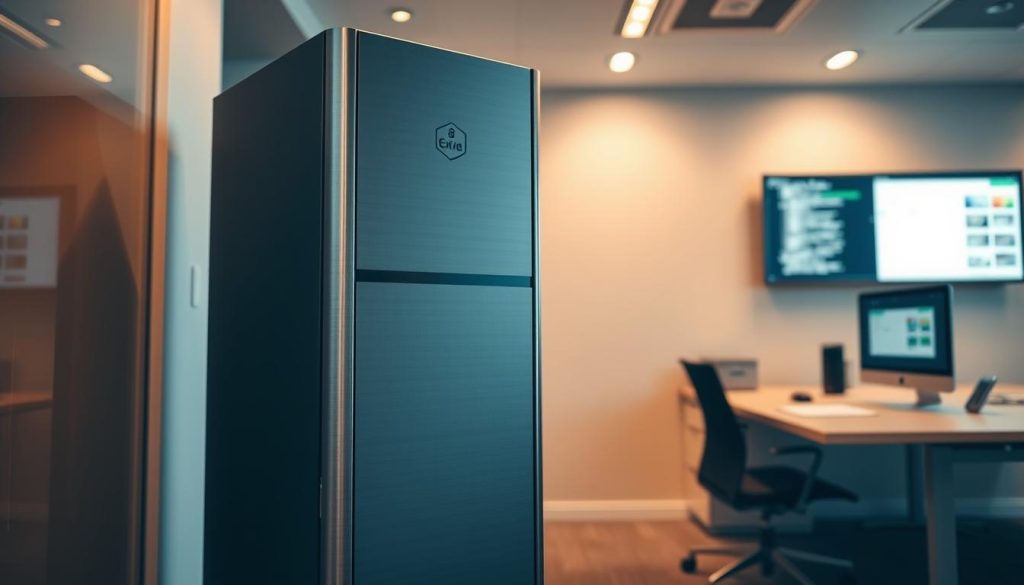In today’s digital landscape, businesses rely heavily on email for communication, making it a prime target for cyber threats. As a result, prioritizing business email security is crucial for protecting sensitive information and maintaining client trust.

A reliable email server is the backbone of any organization’s communication infrastructure. With the rise of cyberattacks and data breaches, implementing a secure email server is no longer a luxury, but a necessity. We will explore the critical role of email security in modern business and the benefits of a robust email server solution.
Key Takeaways
- Prioritizing business email security is crucial in today’s digital age.
- A reliable email server is essential for protecting sensitive information.
- Implementing a secure email server solution can prevent cyber threats.
- Email security is vital for maintaining client trust and reputation.
- A robust email server infrastructure is necessary for business continuity.
The Critical Role of Email Security in Modern Business
As businesses increasingly rely on email for communication, the importance of robust email security cannot be overstated. Email has become the backbone of business communication, and its security is crucial for protecting sensitive information and maintaining trust with clients and partners.
Current Email Security Threats Facing Businesses
Businesses today face a multitude of email security threats, including phishing attacks, malware, and ransomware. These threats can lead to significant financial losses, damage to reputation, and compromised sensitive information. Cybercriminals are continually evolving their tactics, making it essential for businesses to stay vigilant and proactive in their email security measures.
The Cost of Email Security Breaches
The cost of email security breaches can be substantial, with the average cost of a data breach being significant. According to recent studies, the financial impact of a breach includes not only direct costs but also indirect costs such as loss of customer trust and damage to brand reputation. Implementing robust email security measures is crucial for mitigating these risks and protecting business assets.
By understanding the current email security threats and the potential costs of security breaches, businesses can take proactive steps to enhance their email security posture and protect their critical assets.
What Is a Secure Email Server and How Does It Work?
A secure email server is designed to safeguard email communications through robust security measures and protocols. We, as experts in cybersecurity, understand the importance of protecting email communications from various threats. A secure email server is built with several core components that work together to ensure the security and integrity of email communications.
Core Components of a Secure Email Server
The core components include robust security protocols, advanced threat detection systems, and encryption technologies. These components work in tandem to prevent unauthorized access, detect and block malicious emails, and encrypt email content to prevent eavesdropping.
Security Protocols and Standards
Security protocols and standards play a crucial role in ensuring the security of email communications. These protocols govern how emails are transmitted, received, and stored.
SMTP, IMAP, and POP3 Security
SMTP (Simple Mail Transfer Protocol), IMAP (Internet Message Access Protocol), and POP3 (Post Office Protocol version 3) are common email protocols used for sending and retrieving emails. Securing these protocols is essential to prevent email tampering and unauthorized access. For instance, using SMTP over TLS (Transport Layer Security) can encrypt email transmissions.
TLS and SSL Implementation
TLS and SSL (Secure Sockets Layer) are cryptographic protocols used to provide secure communication between email servers and clients. Implementing TLS and SSL encryption ensures that email communications remain confidential and tamper-proof.
| Protocol | Primary Use | Security Features |
|---|---|---|
| SMTP | Sending emails | Can be secured with TLS |
| IMAP | Retrieving and managing emails | Supports encryption with TLS |
| POP3 | Retrieving emails | Can be secured with SSL/TLS |
By understanding and implementing these security protocols and standards, businesses can significantly enhance the security of their email communications. We recommend a comprehensive approach to email security, incorporating multiple layers of protection to safeguard against evolving cyber threats.
Key Benefits of Implementing a Secure Email Server
A secure email server offers numerous benefits, including enhanced data protection and improved regulatory compliance. By implementing such a server, businesses can significantly bolster their email security posture.
Data Protection and Privacy Advantages
A secure email server provides robust data protection by encrypting emails both in transit and at rest. This ensures that sensitive information remains confidential and protected from unauthorized access.
Compliance with Regulatory Requirements
Many industries are subject to strict regulations regarding data privacy and security. A secure email server helps businesses comply with these requirements, reducing the risk of non-compliance and associated penalties.
Enhanced Business Reputation and Trust
By demonstrating a commitment to email security, businesses can enhance their reputation and build trust with their clients and customers. This can lead to increased customer loyalty and a competitive advantage in the market.
| Benefit | Description |
|---|---|
| Data Protection | Encryption of emails to protect sensitive information |
| Regulatory Compliance | Adherence to industry regulations regarding data privacy |
| Business Reputation | Enhanced trust and reputation through robust email security |
Essential Features of an Enterprise-Grade Secure Email Server
In the realm of business email security, an enterprise-grade secure email server stands out due to its robust security features. We recognize the importance of a comprehensive email security solution that not only protects against threats but also ensures the integrity and confidentiality of business communications.
Encryption Technologies
Encryption is a critical component of email security. Enterprise-grade email servers utilize advanced encryption technologies such as PGP (Pretty Good Privacy) and TLS (Transport Layer Security) to safeguard emails both in transit and at rest. These technologies ensure that even if emails are intercepted, they cannot be read without the decryption key.
Authentication Mechanisms
Robust authentication mechanisms are vital to prevent unauthorized access to email accounts. Enterprise-grade secure email servers implement multi-factor authentication (MFA), SPF (Sender Policy Framework), DKIM (DomainKeys Identified Mail), and DMARC (Domain-based Message Authentication, Reporting, and Conformance) to verify the authenticity of senders and prevent email spoofing.
Spam and Malware Filtering
Effective spam and malware filtering is another essential feature. Advanced filtering technologies use machine learning algorithms and real-time threat intelligence to identify and block malicious emails before they reach the user’s inbox, thereby protecting against phishing attacks and malware infections.
Backup and Recovery Options
Finally, comprehensive backup and recovery options ensure that email data is not lost in case of a disaster or system failure. Enterprise-grade secure email servers provide regular backups and rapid recovery options to minimize downtime and ensure business continuity.
| Feature | Description | Benefit |
|---|---|---|
| Encryption Technologies | PGP and TLS encryption | Protects email content from interception |
| Authentication Mechanisms | MFA, SPF, DKIM, DMARC | Prevents unauthorized access and email spoofing |
| Spam and Malware Filtering | Advanced filtering with machine learning | Blocks malicious emails and phishing attacks |
| Backup and Recovery Options | Regular backups and rapid recovery | Ensures business continuity in case of data loss |
On-Premises vs. Cloud-Based Secure Email Servers
When deciding on a secure email server, businesses must weigh the advantages and disadvantages of on-premises versus cloud-based solutions. This comparison is crucial for determining which deployment model best suits their security needs and operational requirements.

Comparing Cost Structures
The cost implications of on-premises and cloud-based email servers differ significantly. On-premises solutions require substantial upfront investments in hardware and software, as well as ongoing maintenance costs. In contrast, cloud-based services typically operate on a subscription model, reducing initial expenses but potentially leading to higher long-term costs if not managed carefully.
- On-Premises: High initial investment, maintenance and upgrade costs, and potential for hardware obsolescence.
- Cloud-Based: Lower upfront costs, predictable subscription fees, but potential for escalating costs with scale.
Security Considerations for Each Deployment Model
Security is a paramount concern for both on-premises and cloud-based email servers. On-premises solutions offer greater control over security measures, allowing for customized implementations. Cloud-based services, however, benefit from the provider’s expertise and resources dedicated to security, often providing robust protection against various threats.
- On-Premises Security: Customizable security protocols, direct control over data, but requires in-house expertise.
- Cloud-Based Security: Leverages provider’s security expertise, regular updates, and scalability, but relies on provider’s security practices.
Scalability and Maintenance Requirements
Scalability and maintenance are critical factors in the decision-making process. On-premises solutions require businesses to scale their infrastructure manually, which can be time-consuming and costly. Cloud-based services, on the other hand, offer scalable solutions that can adapt to growing business needs without significant additional investment.
| Feature | On-Premises | Cloud-Based |
|---|---|---|
| Scalability | Manual scaling, potentially costly and time-consuming | Automatic scaling, flexible and cost-effective |
| Maintenance | In-house maintenance required, resource-intensive | Managed by the provider, reducing internal resource burden |
How to Set Up a Secure Email Server for Your Business
To ensure the integrity and confidentiality of business communications, setting up a secure email server is paramount. A secure email server not only protects sensitive information from cyber threats but also helps in maintaining compliance with regulatory requirements.
Hardware and Software Requirements
Before setting up a secure email server, it’s crucial to determine the appropriate hardware and software requirements. This includes:
- Server Hardware: Adequate processing power, memory, and storage capacity.
- Operating System: A secure and up-to-date operating system, such as Linux or Windows Server.
- Email Server Software: Reliable email server software that supports security protocols like TLS.
Step-by-Step Implementation Guide
Implementing a secure email server involves several key steps:
- Configure the server hardware and install the chosen operating system.
- Install and configure email server software, ensuring it is set up to use secure protocols.
- Implement user authentication mechanisms, such as two-factor authentication.
- Configure spam and malware filtering to protect against unwanted emails and malicious content.
Testing and Verification Procedures
After setup, thorough testing is necessary to ensure the email server’s security and performance.
Security Testing Protocols
This involves testing the server’s defenses against various types of attacks and ensuring that all security measures are functioning correctly.
Performance Benchmarking
Performance benchmarking helps in identifying any bottlenecks or areas for optimization, ensuring the email server operates efficiently under various loads.
By following these steps and ensuring that your email server is properly configured and maintained, you can significantly enhance the security and reliability of your business’s email communications.
Integrating Your Secure Email Server with Existing Business Systems
A seamless integration of a secure email server with your CRM and ERP systems can significantly streamline your business operations. This integration not only enhances productivity but also ensures that your email communications are secure and compliant with regulatory requirements.
CRM and ERP Integration Considerations
When integrating your secure email server with CRM and ERP systems, it’s crucial to consider the compatibility of the systems and the potential impact on your business processes. API connectivity and data synchronization are key factors to ensure seamless integration.
For instance, integrating your email server with a CRM system allows for automatic logging of emails, enhancing customer relationship management. Similarly, ERP integration can streamline financial and operational data, improving overall business efficiency.
Single Sign-On Implementation
Implementing Single Sign-On (SSO) can significantly simplify access to multiple applications, including your secure email server. SSO enhances user experience by reducing the number of login credentials, thereby improving productivity.
SSO also improves security by reducing the risk of password fatigue, which can lead to weaker passwords. By integrating SSO with your secure email server, you can ensure that access is controlled and monitored efficiently.
Mobile Device Management
With the increasing use of mobile devices in business, Mobile Device Management (MDM) has become crucial. Integrating your secure email server with MDM solutions ensures that emails accessed on mobile devices are secure and compliant with company policies.
MDM allows for remote wipe capabilities, encryption, and other security measures to protect business data on mobile devices. This integration is vital for maintaining the security and integrity of your email communications.
Industry-Specific Secure Email Server Requirements
Different industries have unique email security requirements that necessitate tailored solutions to protect sensitive information. As we explore the specific needs of various sectors, it becomes clear that a one-size-fits-all approach to email security is inadequate.
Healthcare Email Security (HIPAA Compliance)
The healthcare industry is subject to stringent regulations, particularly the Health Insurance Portability and Accountability Act (HIPAA). Email servers used in healthcare must be compliant with HIPAA standards, ensuring the confidentiality, integrity, and availability of protected health information (PHI). Encryption and access controls are critical components of HIPAA-compliant email servers.
Financial Services Email Protection
Financial institutions face unique email security challenges, including phishing attacks and data breaches that can lead to significant financial losses. Secure email servers for financial services must implement robust threat detection and authentication mechanisms to prevent unauthorized access. Compliance with regulations such as the Gramm-Leach-Bliley Act (GLBA) is also essential.
Legal Industry Email Security Needs
The legal industry handles sensitive client information, making email security a top priority. Law firms require email servers that offer advanced encryption and secure data storage. Compliance with regulations like the General Data Protection Regulation (GDPR) and the American Bar Association (ABA) guidelines is crucial for maintaining client trust and avoiding legal repercussions.
By understanding the specific email security needs of different industries, businesses can implement effective solutions that protect their communications and maintain regulatory compliance.
Measuring the ROI of Your Secure Email Server
Understanding the return on investment (ROI) of a secure email server is crucial for businesses to justify their cybersecurity expenditures. To effectively measure this ROI, we need to examine several key performance indicators.
Security Incident Reduction Metrics
One of the primary benefits of a secure email server is the reduction in security incidents. By implementing robust security measures such as encryption and advanced threat detection, businesses can significantly decrease the number of email-related security breaches. Tracking the frequency and impact of these incidents before and after the implementation of a secure email server provides valuable insights into its effectiveness.
Productivity and Efficiency Gains
A secure email server can also lead to productivity and efficiency gains by reducing the time spent on managing email security threats. With a reliable secure email server, IT teams can focus on more strategic tasks rather than constantly mitigating email-based attacks.
Total Cost of Ownership Analysis
Conducting a total cost of ownership (TCO) analysis is essential for understanding the financial implications of implementing and maintaining a secure email server. This includes not only the initial setup costs but also ongoing maintenance, support, and any additional security measures required.
By analyzing these metrics, businesses can gain a comprehensive understanding of their secure email server’s ROI, enabling them to make informed decisions about their cybersecurity investments.
Conclusion
As we have discussed, a reliable secure email server is crucial for protecting sensitive business information and maintaining the trust of clients and customers. Email security is no longer a peripheral concern but a central aspect of a company’s overall security posture.
By implementing a secure email server, businesses can safeguard their email communications against various threats, including data breaches and cyber attacks. This not only ensures the confidentiality and integrity of business communications but also helps in complying with regulatory requirements.
We recommend that businesses prioritize email security by investing in a robust secure email server solution. This will enable them to protect their reputation, maintain customer trust, and stay ahead of emerging email security threats.
FAQ
What is the primary purpose of a secure email server?
The primary purpose of a secure email server is to protect sensitive information and maintain the trust of clients and customers by safeguarding email communications against various security threats.
What are the most common email security threats facing businesses?
Businesses face numerous email security threats, including phishing attacks, malware, and ransomware, which can result in significant financial losses and damage to reputation.
What are the core components of a secure email server?
A secure email server is built with several core components, including robust security protocols and standards such as SMTP, IMAP, and POP3 security, as well as the implementation of TLS and SSL encryption.
How does a secure email server ensure data protection and privacy?
A secure email server ensures data protection and privacy by implementing robust encryption technologies, reliable authentication mechanisms, and effective spam and malware filtering.
What are the benefits of implementing a secure email server?
Implementing a secure email server offers numerous benefits, including enhanced data protection and privacy, compliance with regulatory requirements, and an improved reputation.
What are the essential features of an enterprise-grade secure email server?
An enterprise-grade secure email server should include robust encryption technologies, reliable authentication mechanisms, effective spam and malware filtering, and comprehensive backup and recovery options.
What are the differences between on-premises and cloud-based secure email servers?
On-premises and cloud-based secure email servers differ in their cost structures, security considerations, and scalability requirements, making it essential for businesses to evaluate their needs before choosing a deployment model.
How do I set up a secure email server for my business?
Setting up a secure email server requires careful planning and execution, involving hardware and software requirements, implementation, and testing procedures.
How can I integrate my secure email server with existing business systems?
Integrating a secure email server with existing business systems, such as CRM and ERP, requires careful consideration of single sign-on implementation and mobile device management.
What are the industry-specific secure email server requirements?
Different industries have unique email security requirements, such as HIPAA compliance for healthcare organizations, financial services email protection, and legal industry email security needs.
How can I measure the ROI of my secure email server?
Measuring the ROI of a secure email server involves tracking security incident reduction metrics, productivity and efficiency gains, and total cost of ownership analysis.
What is the importance of TLS and SSL encryption in email security?
TLS and SSL encryption are crucial in email security as they provide a secure channel for email communications, protecting sensitive information from interception and eavesdropping.
How does a secure email server help with regulatory compliance?
A secure email server helps with regulatory compliance by implementing robust security measures and controls, ensuring that email communications meet the required standards and regulations.





